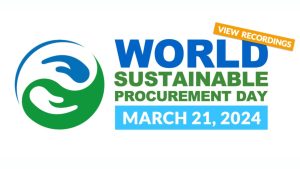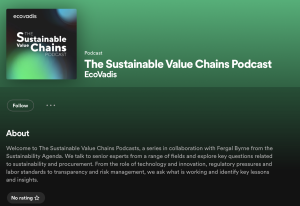While the agreements and targets reached at Copenhagen are still a shadow of the outcomes the world was expecting (and required?) from the environmental talks, Green Procurement will still need to be the way forward for companies to meet their CSR and to unlock sustainable value in their supply chains.
SmartProcurement asked the procurement departments of different organisations what their current Green Procurement policies include and what they should include.
What is Green Procurement?
“It is an approach to Procurement in which environmental impacts affect important purchasing decisions, not only price and quality,” says Andrew C. Hillman, former MD of renewable energy company Bioenergy Africa and former member of the Procurement team that initiated sustainable Procurement policies at Pfizer South Africa.
Sustainable Procurement, often referred to as Green Procurement, involves organisations practicing procurement with the view of maximising net benefits for themselves and the wider world. Extrinsic cost considerations must be incorporated into decisions alongside the conventional procurement criteria of price and quality and are typically divided into the following groups: environmental, economic and social, also know as the ‘triple baseline’, says Hillman.
Green Procurement aims to improve our national environment, with the participation of all key stakeholders – suppliers, employees and the general public alike, says Jennifer Steyn, Absa Sustainability Program Manager.
“This entails more than saving energy and water; it’s about creating a balanced world by driving a powerful common agenda. Absa’s aim is to work with its suppliers to collectively improve its approach and drive its corporate social responsibility (CSR) agenda for the common good of all South Africans,” says Steyn.
What should a Green Procurement policy include?
Hillman: “Many opportunities exist to make an organisation’s operations more environmentally friendly. However, it’ll have to find the ones appropriate to its business to reduce environmental impact.
“Opportunities include using recycled paper produced with environmentally friendly bleaching methods; environmentally friendly computer equipment with reduced energy usage; carbon offsetting; no asbestos, pesticides and ozone depleting substances; minimal packaging on products; products transported with biodiesel or choosing manufacturing facilities which bear environmental certifications.
Steyn: “There are statute-driven objectives that we must meet, and then there are objectives that can only be reached by being true to our leadership principles. South African environmental and other issues are very different from the ones faced by Europe and the USA. Our approach, therefore, needs to take this into account so that we may succeed in taking care of our environment and our people.
“Absa Group Sourcing launched the Supply Chain Corporate Responsibility (SCCR) initiative in February 2008. This created a new framework for Absa and its suppliers to work together with the placing of CSR at the heart of our collective agendas.
The aim of the Absa SCCR programme is to shift managerial focus towards a more active form of business leadership, which will identify and embrace the commercial opportunities arising from the changes necessary in ethical, social and environmental requirements.
How can Procurement departments structure sourcing agreements to promote Green Procurement?
Hillman: “At a supplier level: choose suppliers that are committed to minimising waste and benefitting the environment. Use products made by companies which are committed to environmental stewardship.”
“Owed to their huge purchasing power, governments can have a profound effect on the sustainability practices of their contractors, consultants and suppliers. With a spend of $-billions they can make a big difference in the market feasibility of green products, e.g. Former President Bill Clinton’s executive order requiring all federal agencies to buy only Energy Star certified computers, which drove down an estimated 2,3-billion kilowatt hours of electricity and untold costs in 1994 and 1995 alone.
Also check out the ICLEI and Procura+ Campaigns (Europe), Green Purchasing Network (Japan) and Framework for Sustainable Development on the Government Estate (U.K.).
Steyn: “Closer and continued collaboration will be essential in achieving Absa’s goals. Absa has been actively gathering information from its suppliers in terms of environmental focus as well as ethical and social issues since 2008.
We ask them to detail their approach to managing corporate responsibility in their own organisations and supply chains. This forms an important element in our assessment of both current and potential suppliers and will mitigate potential risks to policy’s performance.
For more information please email Jennifer Steyn at jennifer.steyn@absa.co.za, or Andrew C. Hillman at ahillman@commerce-edge.com


























